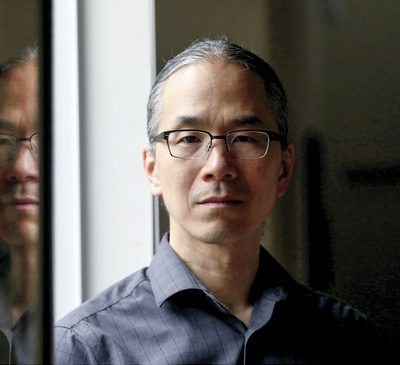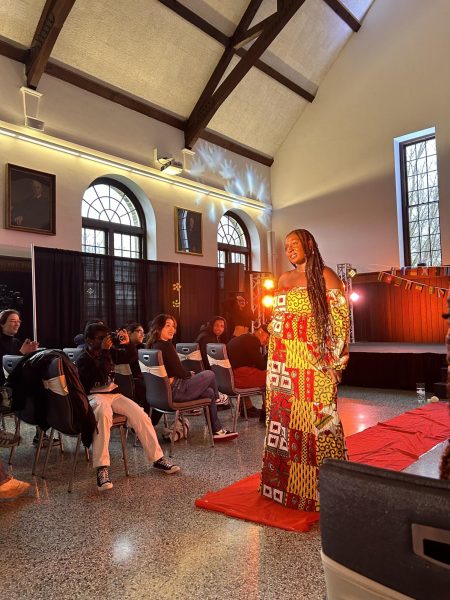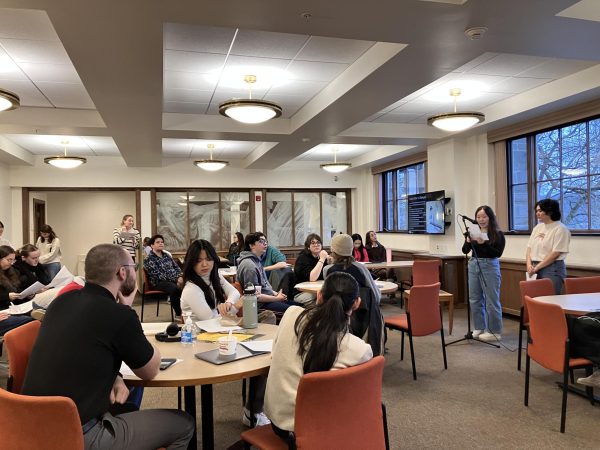Ted Chiang Speaks at Living Writers

Alan Berner via Colgate University
SCI-FI AND PHILOSOPHY: Ted Chiang visits Colgate University to talk about his acclaimed work “Exhalation” and his views on writing and the world.
On Sept. 30, Colgate hosted author Ted Chiang as a part of its ongoing Living Writers series. Chiang penned “Exhalation,” a collection of science fiction stories whose imaginary settings push readers to ponder real philosophical questions. What if we could converse with versions of ourselves who made different choices? How do religion and science coexist? Do we actually have free will, or is that just an illusion we protect for our own sanity? “Exhalation” brings together Chiang’s fascination with technology, science fiction and philosophical thought experiments. Chiang has won four Hugo, four Nebula, and four Locus awards for his work and a story from his 2002 debut collection “Stories of Your Life and Others” inspired the Oscar-winning film “Arrival,” starring Amy Adams and Jeremy Renner. “Exhalation” was hailed as one of the best books of 2020 by New York Times, the Washington Post, Time, NPR and the Guardian.
“Mr. Chiang explores the possibilities and limits of human curiosity, the consequences of having free will, the effect of contingency in all of our lives. Mr. Chiang’s stories offer true narrative pleasure as you wonder what it might be like to leap through the hoops of time portals, to study your own mind and what makes it go, to hear the voice of a parrot telling you it loves you and to be good,” Director of the Living Writers program and Associate Professor of English Jennifer Brice said.
After Brice’s introduction, Chiang took the podium and delved into an illuminating talk about the differences between, and virtues of, sci-fi versus magic in fiction. Chiang argues that the way a story treats the impossibilities of a fictional world is what determines science fiction versus magic. He describes the technologies in science fiction, like the mechanical nannies and virtual pets called “digients” in “Exhalation,” as part of the science fiction genre because they are reproducible and available to the masses. Anyone, he argues, can create or own these technologies and the use of them is not dependent on the individual. Magic, on the other hand, is only available to a chosen few, like Gandalf in “Lord of the Rings” or the wizarding community in “Harry Potter.” Only magicians can manipulate the elements or wield a wand, and there is a narrative arc in which they prove their worthiness of magic and grapple with the limits of their magic.
“I had never thought much about the difference between sci-fi and fantasy, but after hearing Chiang’s presentation it made me notice all of the characteristics of sci-fi that he mentioned! A lot of his stories in ‘Exhalation’ involved widely available technologies, like the digients, but I had never thought about how that was connected to the personal versus impersonal nature of the universe,” senior Alyson Brusie said.
Chiang’s differentiation between science fiction and magic sheds light on how he views the world. He spoke at length about how science fiction exists within a mechanical, impersonal universe in which our actions do not cause some sort of reciprocal action from the universe. There is no “karma,” no cosmic punishment or reward based on our actions, simply because the universe is purely physical and does not acknowledge the actions of individuals. Seeing the world and our existence through this lens can spark a spiral of pessimism that makes one think that one’s actions hold no meaning. This nihilism is juxtaposed by the personal universe within which magic resides. A magical world implies that we as individuals matter, can be chosen for the privileges of something as sacred as magic and that what we do has an effect on the world.
Chiang’s work reconciles the two perspectives through the medium of narrative, humanistic science fiction. He described himself as someone who can very easily tend towards pessimism but still maintains an optimistic view of the world, and that glimmer of hope is threaded throughout “Exhalation.”
“Is the universe that we live in mechanistic or does it recognize persons? I think we live in a mechanistic universe, but I also recognize that many people think otherwise. Is there a way to resolve this question instrumentally?” These are the questions Chiang posed to the audience and seeks to answer in his collection of stories.
Chiang is firm in his beliefs about the mechanistic, impersonal nature of our world but is open-minded to differing opinions and discussions on the topic. After his presentation, Chiang answered questions from eager audience members on topics such as his previous work in the software industry, its role in his worldview and his writing process. Chiang’s visit prompted readers to question how they see the world, their importance in it and how fiction can shape the lens through which we see the world.






